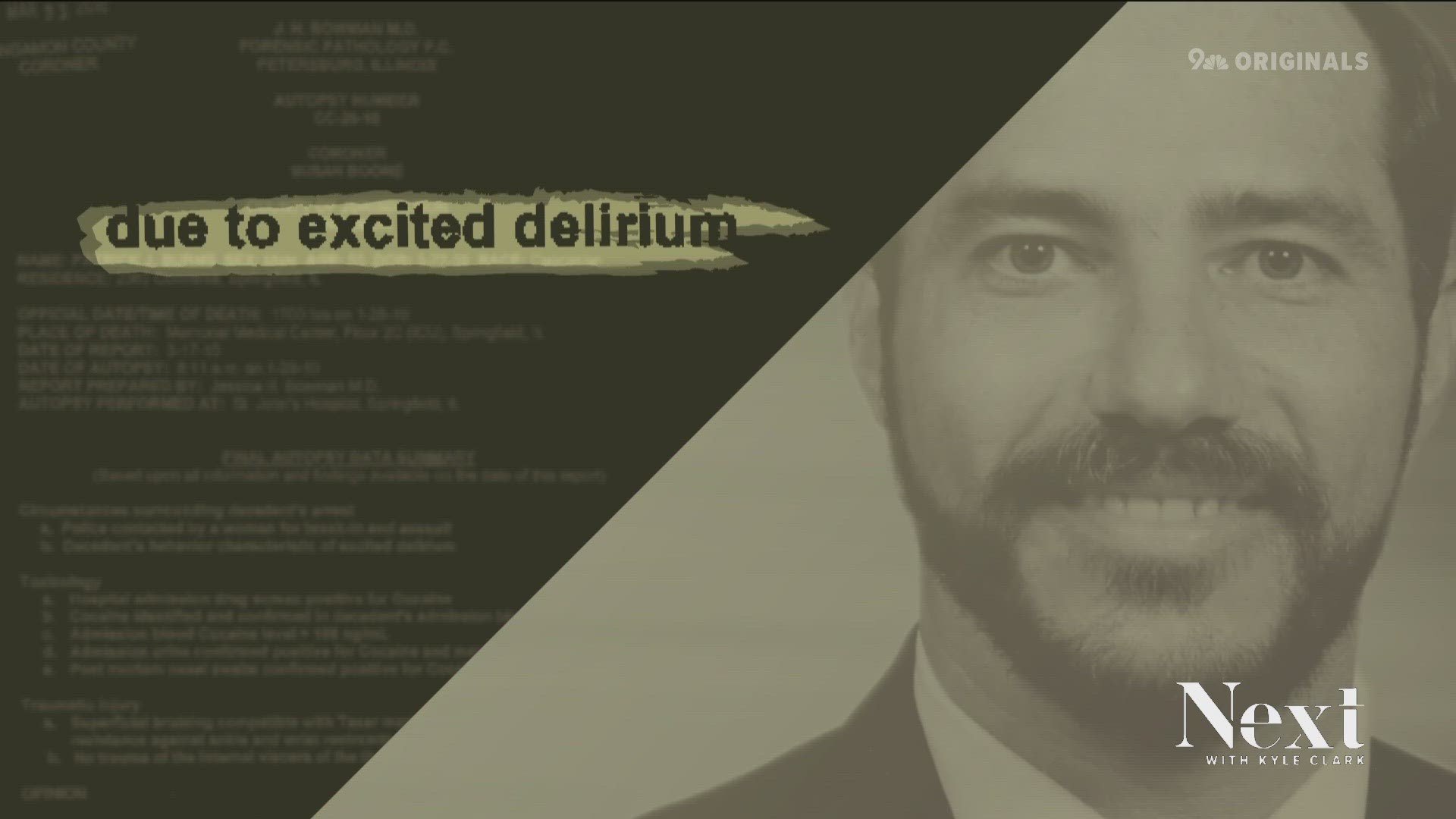DENVER — Colorado’s coroners appear ready to ditch use of a controversial term after one of the leading societies in the field of death investigations ditched use of the term itself.
The term “excited delirium” has been used for decades to help exonerate law enforcement of any wrongdoing after someone dies in their custody.
Earlier this year, the National Association of Medical Examiners – or NAME – revealed to 9NEWS that it cannot endorse use of the term “excited delirium” moving forward. The decision, announced in response to an ongoing 9NEWS ORIGINALS investigation, sent a seismic wave throughout the world of American death investigations.
In Colorado, our investigation has now discovered the term is effectively dead following the NAME announcement. We queried all 64 Colorado’s coroners and asked them if they would use the term in future cases.
Not one said they would.
There’s just one problem.
At a time when no major medical organizations recognize “excited delirium” as a medical diagnosis, Colorado’s Department of Public Health and Environment says the now widely discredited term has turned up on at least 29 death certificates issued by the state since 1998.
Many of those deaths appear to have occurred during or shortly after law enforcement restraint. And no one in a position to reexamine those cases appears anxious to do so -- at least not here in Colorado.
Patrick Burns
The 2010 death of Patrick Burns in Springfield, Illinois, didn’t exactly lead to national headlines. It received a few mentions in the local newspapers and television stations.
It didn’t stop his brother, Richard Burns, from talking about it for years.
“Yeah, he was my friend. He was the best man in my wedding, and I was the best man in his,” Richard Burns said. “He was always there to show me the way. I owe a lot to the guy.”
Richard never bought the official explanation of his brother’s death that happened not long after Sangamon County deputies restrained and repeatedly tased Patrick.


“Excited delirium”
It’s listed as the cause of death on his autopsy report.
“I had never heard of it before,” said Richard. He then looked for legal assistance. He wanted a better explanation.
That’s when he heard it.
“Phantom diagnosis.”
It’s what a lawyer told them about the term. A convenient excuse for a death that happens during or after law enforcement restraint.
It’s why the family hired an outside forensic pathologist to review the death.
That doctor used entirely different language to explain why Patrick died.
“The death of this 50-year-old White male, Patrick Burns, is due to anoxic brain injury due to restraint in a prone position, hogtied following physical subdual and multiple applications of Taser devices,” wrote. Dr. John Ralston.
It didn’t matter.
Following an inquest, the initial conclusion of “excited delirium” remained. From there, the term made its way onto the death certificate.
So, what is excited delirium?
Even now, decades after it was first identified, it’s not terribly easy to define. It’s thought to be a rare condition marked by superhuman strength, imperviousness to pain, extreme agitation and – on occasion – sudden death.
Police train for it. Colorado, for example, requires all new officers know what it is. Ask officers about it, and they’ll likely tell you they or someone they know have seen it.
There’s just one big problem.
As of today, no major medical organization recognizes it.
Not the American College of Emergency Physicians. Not the American Medical Association or the American Psychiatric Association.
And, as of this spring, not the National Association of Medical Examiners.
People may very well show the symptoms of “excited delirium,” but it should not be used as an official cause of death. “NAME does not endorse use of the term ‘excited delirium’ as a cause of death,” NAME’s 2023 president told 9NEWS on March 31.
Critics of the term heralded the decision. When Richard Burns saw it, he quickly reached out to the new Sangamon County coroner and asked him to review his brother’s case.
That coroner, Jim Almon, agreed to ask two new forensic pathologists to review the death.
Both concluded restraint asphyxia, and not excited delirium, killed Patrick Burns.
Almon then agreed to help issue a new death certificate. The previous suggested the manner of death was undetermined. This new one called the manner of death a “homicide.”
This many years after the death, it’s not at all certain if any of the deputies could be criminally charged, but Richard Burns says he’s at least proven a point.


“He was very influential in my life. So, to be told that he died of something that didn’t exist, that’s what drove me to fight,” he said.
Our ongoing investigation has connected more than 150 deaths across the U.S. connected to use of the term “excited delirium” since 2010. Almost all happened during or after law enforcement restraint.
As of now, Patrick’s is the only case we know of that has led to a new death certificate.
Alex Gutierrez
Avina Deluna is tired of waiting.
Her father’s death in 2017 in Colorado received even less attention than Patrick Burns’ death received years earlier in Illinois.
“My father had a broken nose. I could physically see the shoe imprint embedded in my father’s cheek, so I knew there was much more to the story than what was being said.
Officially, Alex Gutierrez died of drug-induced “excited delirium,” according to the Adams County coroner.
Police reports reviewed by 9NEWS suggest Gutierrez, while under investigation for dealing drugs in Thornton on March 16, 2017, got into a violent fight with officers trying to arrest him.
We know he was held prone.
We also know the two officers who had body cameras that night failed to turn theirs on during the restraint.


In addition, many of the Thornton officers who restrained Gutierrez “demanded an opportunity to view all available evidence of the incident as a condition precedent to an interview about the facts of the case,” according to the local District Attorney’s review of the case.
Seeing the injuries on Guterriez when he responded to the scene that night, a firefighter asked if Gutierrez had been hit by a car.
Deluna, 19 at the time of her father’s death, never believed “excited delirium” killed her father. “Excited delirium is just a word used as a cover up,” she said.
The coroner’s conclusion helped prosecutors elect not to file charges against any of the officers involved in the restraint.
In July, Deluna asked Adams County Coroner Monica Broncucia-Jordan to review her father’s death in light of the NAME decision.
She has yet to receive a response.
The Adams County Coroner has repeatedly denied our requests for an interview, as well.
'It's a bad term'
Our ongoing investigation has now connected more than 150 deaths since 2010 to use of the term excited delirium. We know of at least 100 of those deaths that involved “excited delirium” turning up on the autopsy report.
Critics of excited delirium have long suggested the term itself is riddled with problems.
“It’s a bad term,” said Dr. Michael Freeman, a forensic epidemiologist and associate professor of forensic medicine at Maastricht University in the Netherlands. He’s studied the subject for years.
“When law enforcement is involved and the death occurs during the restraint, that’s when the term is invoked,” he said. “Ignore the restraint, embrace the excited delirium.”
Last year, Physicians for Human Rights issued a massive report that concluded the term itself is rooted in “racist and unscientific origins.”
“The diagnosis of ‘excited delirium’ has come to rest on racist tropes of Black men and other people of color as having ‘superhuman strength’ and being ‘impervious to pain,’ while pathologizing resistance to law enforcement, which may be an expected or unsurprising reaction of a scared or ill individual (or anyone who is being restrained in a position that inhibits breathing). Presently, there is no rigorous scientific research that examines prevalence of death for people with “excited delirium” who are not physically restrained,” read the report.
In Colorado, the Colorado Department of Public Health and Environment reports the term was used on at least 29 death certificates since 1998. At least 14 of those involved what the state calls “restraint/arrest” while “in-custody.”
SUGGESTED VIDEOS: 9NEWS Originals

